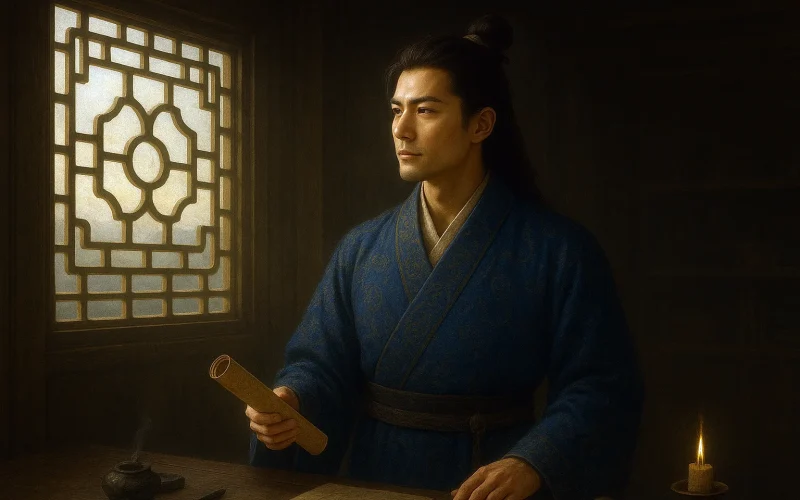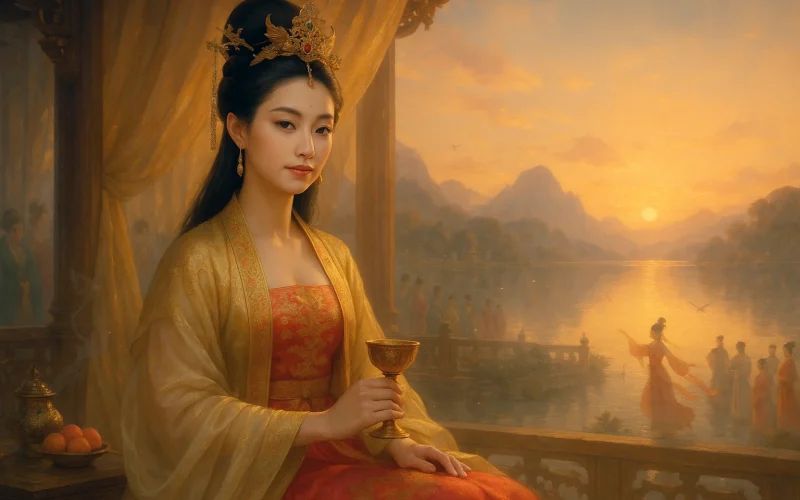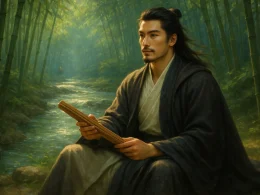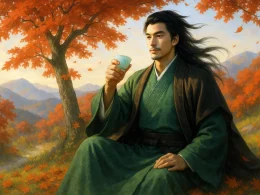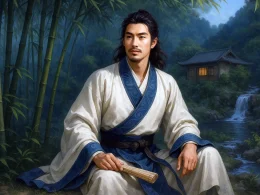Shen Quanqi (沈佺期 c. 656 – 715), styled Yunqing, was a native of Xiangzhou Neihuang (present-day Neihuang, Henan Province). An important poet of the Early Tang Dynasty, he earned the Jinshi degree in 675 AD. He held various official posts, including Tongshi Sheren and Jishi Zhong, but was later exiled to Huanzhou for his association with Zhang Yizhi. After a pardon, he was appointed as a Records Officer (Canjun) of Taizhou. Shen is often mentioned alongside Song Zhiwen, together known as "Shen-Song," and the pair played a decisive role in finalizing the form of the Five-Character Regulated Verse (Wuyan Lüshi). His poetry often consists of court-commissioned pieces and travel-themed reflections, characterized by refined elegance and strict formalism. He was particularly skilled in the Seven-Character Regulated Verse (Qiyan Lüshi), with three volumes of his works preserved in the Complete Tang Poems (Quan Tangshi). His representative piece, "Alone and Unseen" ("Du Bu Jian") – which begins with the line "The young wife of the Lu family in her hall perfumed with tulip" – is hailed as a model of Early Tang Qiyan Lüshi, while "Lodging Overnight at Mount Qipan" exhibits the stark, sober style developed during his exile. Shen Quanqi's work marks the transition from the lingering influences of the Six Dynasties to the emerging spirit of the High Tang, holding milestone significance in the development of Modern Style Poetry (Jinti Shi).
Major Works
Life
Shen Quanqi's official career began after obtaining the Jinshi degree in 675 AD during Emperor Gaozong's reign. His exceptional literary talent gradually granted him access to the inner circles of court culture. The period under Empress Wu Zetian's rule marked the first peak of his literary career. He was grouped with literary figures like Li Jiao, Song Zhiwen, Du Shenyan, Su Weidao, and Cui Rong, collectively known as the "Zhuying Scholars" or frequently associated with the "Four Friends of Letters" (specifically referring to Cui Rong, Li Jiao, Su Weidao, and Du Shenyan). For a long time, he attended the emperor, participating in palace banquets and cultural activities, and produced a large number of "imperial command" (Yingzhi) and "responsive" (Fenghe) poems. These works, aimed at extolling virtues and celebrating peace, established him as one of the most representative court literati of the Wu Zhou period. Beyond his role as a literary attendant, Shen Quanqi also held significant positions like Tongshi Sheren, involved in confidential matters, and eventually rose to Kaogong Yuanwailang, overseeing the imperial examinations. This reflected Empress Wu's recognition of both his literary and administrative capabilities.
The Shenlong Coup of 705 AD marked a major turning point in Shen Quanqi's life. Following Empress Wu's abdication and Emperor Zhongzong's restoration, Shen, who had been associated with Empress Wu's favourites Zhang Yizhi and Zhang Changzong, inevitably faced political reprisal. Accused of close ties with the Zhang brothers, he was imprisoned and subsequently severely punished – exiled to Huanzhou, located far beyond Lingnan (near present-day Vinh, Vietnam). This prolonged period of exile cast him from the splendour of the court into a desolate, miasma-ridden land, inflicting immense physical and mental suffering. Yet, it also significantly broadened his life experience and emotional depth, leading to a fundamental transformation in his poetic creation.
Several years later, Shen Quanqi received a pardon and returned north to Chang'an, re-entering the court's cultural institutions. Around the Jinglong era (707-710 AD), he was appointed as Qiju Lang and concurrently a Zhixueshi of the Institute for the Advancement of Literature (Xiuwen Guan). He later held positions such as Zhongshu Sheren and Taizi Shao Zhanshi (Junior Supervisor of the Household of the Heir Apparent), earning him the moniker "Shen Zhanshi." Although restored to official rank, his state of mind differed greatly from his earlier years after this major upheaval. In the early Kaiyuan era, Shen Quanqi passed away, concluding a complex life that saw him transition from a favoured court minister to an exiled convict, and finally back to a literary attendant.
Stylistic Characteristics
Shen Quanqi's poetic career can be clearly divided into two distinct phases, demarcated by his experience of exile, revealing significant differences in artistic style and emotional depth. However, his exploration and refinement of poetic form, particularly tonal patterns, remained consistent throughout.
1. Early Style: Courtly Yingzhi, Exquisite and Ornate
During Empress Wu Zetian's reign, as a core court poet, the main body of his work consisted of Fenghe and Yingzhi poems created to meet the demands of court culture. These poems covered relatively narrow themes, mostly focusing on depicting court banquets, festival ceremonies, palace gardens, and similar scenes, with their core function being to eulogize virtues and adorn an era of peace. However, in terms of artistic form, these works reached a very high standard, developing a characteristic style of resplendent diction, balanced parallelism, harmonious rhymes, and ingenious conception. Shen Quanqi excelled at polishing phrases, skillfully employing rich rhetoric and complex imagery to depict scenes, creating an atmosphere of dignified elegance and magnificent splendour befitting the court. For example, lines from "In Response to an Imperial Poem on the Spring Day Visit to the Wangchun Palace" such as "Through fragrant fields, bright sun bathes spring's domain; / From palace roofs, a wreathing smoke ascends," while limited in intellectual depth, demonstrate superb technical skill, exquisite parallelism, and bright colours, fully showcasing his masterful command of rhythm and diction. They exemplify the quintessential style of Early Tang court poetry.
2. Later Style: Personal Reflections, Poignant and Profound
The hardship of exile to the southern wilderness was pivotal to the transformation of Shen Quanqi's poetic style. The drastic change in his personal fate, the scenery of the remote frontier, and the sorrow of separation from his homeland infused his poetry with unprecedented genuine and profound emotion. Works from this period shed the ostentation of his earlier phase, turning towards a style characterized by sincere emotion, desolate imagery, concise language, and deep reflection.
- Expansion and Deepening of Themes: His poetic subjects broadened from the narrow confines of the court to include personal reflections, homesickness, depictions of frontier landscapes, and perilous journeys. He poured his grievances, bitterness, loneliness, and profound lamentations on the impermanence of life into his verse.
- Creation of Atmosphere: His poems often feature ominous imagery like "miasma," "poisonous fog," and "barbarian streams," starkly contrasted with symbols of civilization and the centre like "Chang'an" and "Luoyang," constructing poetic atmospheres of desolation, solitude, and pathos. The famous line from "Written from Afar, Matching that of Official Du Shenyan, on Crossing the Ridges" – "Our lands lie ten thousand miles apart; / When shall I stand again before the enlightened throne?" – uses vast geographical separation to profoundly express the political disillusionment and despair of an exile with no hope of return.
- Refinement of Language: While maintaining precise tonal patterns, his language became more unadorned and vigorous, with scenes and emotions blending more naturally and aptly. For instance, in "Lodging Overnight at Mount Qipan," the lines "The waning moon hangs close beside my window; / The River of Stars wheels low before my door" reveal a vast vista within the solitude and sorrow of travel. The observation is meticulous, the perception unique, the technique polished yet the emotion restrained, already hinting at the emerging spirit of the High Tang.
3. Core Artistic Achievement: Finalizing Regulated Verse and Pioneering the Seven-Character Form
Shen Quanqi's most enduring contribution to literary history lies in his collaboration with Song Zhiwen in finalizing the forms of the Five-Character and Seven-Character Regulated Verse. Through explorations by poets since the "Yongming Style" of the Qi and Liang dynasties, the rules and conventions of Lüshi were ultimately established and widely applied in the hands of Shen and Song. Their regulated verses (including Wuyan Lüshi, Qiyan Lüshi, and extended regulated verse Pailü), regardless of length, fully adhered to the tonal, parallel, and linking ("sticking" and "counterpoint") rules of Modern Style Poetry (Jinti Shi), achieving the final leap from theoretical exploration to creative practice and establishing the standard model for later Lüshi composition. The Ming scholar Wang Shizhen succinctly summarized this in Remarks on the World of Poetry (Yi Yuan Zhi Yan): "With Shen [Quanqi] and Song [Zhiwen], the five-character verse can truly be called Lü. Lü means tonal rules and laws; nothing under heaven is stricter than this. Understanding that level and oblique tones cannot be used arbitrarily, the principles and measures become clear."
His representative work, "Alone and Unseen" (also known as "An Old Theme, Presented to Qiao Bique, Zhi"), is universally recognized as a highly artistically mature Seven-Character Regulated Verse, playing a foundational role in the finalization and development of the Qiyan Lüshi genre.
Influence and Literary Historical Status
Shen Quanqi holds a pivotal, connecting position in the history of Chinese poetry, with a profound and concrete influence.
1. Founder and Codifier of the Finalized Regulated Verse
This is Shen Quanqi's most central historical achievement. Together with Song Zhiwen, through their own extensive, high-quality creative practice, they ultimately established Regulated Verse (Lüshi) as an independent poetic form with strict rules and unique aesthetic appeal. The Yuan scholar Xin Wenfang evaluated this, stating that poets like Shen and Song "refined and practised with precision, achieving stability and tonal momentum; this is what is called Lüshi." This contribution definitively resolved the key issue of poetic tonal regulation since the Qi and Liang periods, directly inaugurating the golden age of Lüshi composition in the High Tang and later eras. The glorious achievements in Lüshi by later masters like Wang Wei and Du Fu are all built upon the tonal foundations laid by Shen and Song.
2. Propelling Poetry from Courtly Entertainment to Personal Lyricism
Although Shen Quanqi was famous for his court poetry, the works expressing genuine personal emotion, born from political setbacks and exile, hold significant literary historical importance. These works redirected poetry from being a tool for flattery back towards the tradition of "articulating intent" (yanzhi) and "expressing emotion" (shuqing). Echoing the poetic reform trends initiated by the "Four Elites of the Early Tang," they demonstrated the transitional traces of poetry shifting towards the High Tang sound, which emphasized emotional expression and the construction of "wind and bone" (fenggu). His experiences and creations provided an early model for how High Tang poets could integrate personal destiny with the spirit of the age into their poetry.
3. The Literary Historical Verdict and Exemplary Significance of the "Shen-Song" Couplet
Since the Tang Dynasty itself, the coupling of "Shen-Song" has been an established verdict in literary history. They are regarded as literary icons of an era, collectively representing the highest achievement in the technical aspects of tonal regulation in Early Tang poetry, and are key figures connecting the Early and High Tang. The New Book of Tang · Biographies of Artists and Men of Letters explicitly summarizes their contribution: "From the Jian'an era of Wei through the Jiangzuo period [the Eastern Jin and Southern Dynasties], poetic rules underwent frequent changes. Up to the times of Shen Yue and Yu Xin, who used phonology to weave words together, achieving a meticulous parallelism. By the time of Song Zhiwen and Shen Quanqi, the style became even more refined and beautiful; they conscientiously avoided tonal faults and rigorously structured lines and stanzas, creating patterns as intricate as brocade and embroidery. Scholars revered them, referring to them collectively as 'Shen-Song'." Consequently, later discussions on the development of Lüshi inevitably begin with Shen and Song, as their works became the essential models for mastering the rules of Modern Style Poetry.
In summary, Shen Quanqi was a pivotal literary figure embodying the dual identities of court poet and codifier of Regulated Verse. His early creations represent one of the pinnacles of Early Tang court literature, while his later works, infused with depth through personal misfortune, revealed new directions for poetic development. His greatest historical contribution lies in finalizing the form of Regulated Verse together with Song Zhiwen, technically laying the most solid formal foundation for the comprehensive flourishing of High Tang poetry—an influence that permeates the entire history of Chinese poetry.






